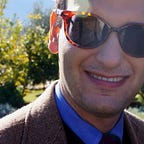I’ve been having more time to read (no prizes for guessing why) so decided to already post the books I’ve read so far this month.
The highlight was definitely The Glass Hotel, by Emily St. John Mandel. The first book of hers that I’d read was “Station Eleven”, an incredible book about a global flu pandemic that destroys civilization as we know it (I cannot recommend reading this book right now). The Glass Hotel is a very different novel — an odd mixture between a thriller about financial fraud, a ghost story, and a meditation on paths taken and not taken through life. It’s contemplative and beautifully written, but also keeps pulling you forward through the pages. I enjoyed the mix of page-turning and emotional depth — read it very quickly, but feel that I will be thinking about it for a long time, as I did with “Station Eleven”.
I also went back to Saga, Brian K. Vaughan’s 54-issue comic series (currently on hiatus), which I’d read part of in the past. It’s a science-fiction story about an interracial (as in, alien races) couple and their baby daughter, fugitives amidst an intergalactic war. The compelling thing about this series is not the sci-fi aspect, but the characters, their interactions, the sense of family between them. That said, Vaughan is wonderfully relaxed in his world-building, not taking himself seriously at all, which lends an immense richness to the many, many characters that populate this gorgeous comic. Highly recommended.
The Wall, by John Lanchester, is a novel about a not too distant future when, after a climate catastrophe, a wall has been built around England to stop migrants from coming in. The book is the story of a young man whose mandatory tour of duty guarding the Wall ends in disaster. I liked it very much. Short and makes you think. And dystopias all of a sudden all seem much more realistic.
Finally, Samantha Harvey’s The Western Wind had great reviews, but was a bit of a disappointment for me. A murder mystery set in a small village in medieval England, narrated by the village priest, who narrates four days of occurrences… backwards. The writing is good,b ut it didn’t captivate me, and the backwards structure, while clever, was ultimately a bit too artificial.
